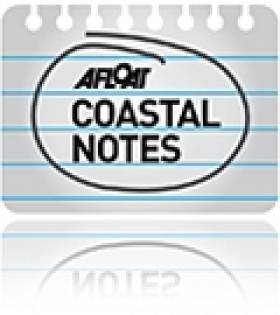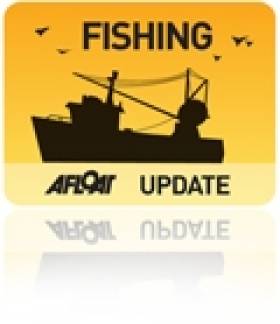Displaying items by tag: marine resources
#Crowdfunding - Campaigning documentary maker Richie O'Donnell is turning to the public to help fund his latest film about Ireland's marine resources.
The filmmaker behind critically acclaimed documentary The Pipe, about the controversial Corrib Gas Pipeline, tells TheJournal.ie that his new project takes a much broader scope, specifically the fishing and petrochemical resources off Ireland's Atlantic coast.
With Atlantic, O'Donnell is attempting to "connect the dots" between Ireland's attitude to fishing and the State's management of offshore oil and gas.
To this end he has shot footage and interviews among West of Ireland coastal communities as well as much further afield in Norway and Newfoundland.
And his ambitious film has an appropriately ambitious funding target of €25,000 - the largest yet on Irish crowdfunding website Fundit.
"If we can do this and bring the film straight to the people who want to watch it," says O'Donnell, "then that could open up a massive opportunity.”
TheJournal.ie has much more on the story HERE.
Cork To Host Workshop On EU 'Blue Growth' Strategy
#MarineResources - The fifth and final Regional Consultative Atlantic Forum Workshop will be held at University College Cork from 4-5 March 2013.
Following previous workshops in Horta, Brest, Bilbao and Cardiff, the two-day event will input to the definition of the European Union Strategy for the Atlantic Action Plan (2014-2020).
Blue growth and creating sustainable jobs are at the heart of the Atlantic Action Plan, which will focus on harnessing the enormous untapped economic potential of Atlantic coasts, seas and oceans.
According to the Marine Institute, ocean energies, seabed mining, marine biotechnology and other emerging sectors, as well as a revitalisation of traditional activities such as fisheries, aquaculture and tourism – driven by research, technology and innovation – can contribute to the development of a 'blue economy' in Europe that can provide jobs and spur economic growth.
New advances in science and technology place us in a unique position to benefit from the sea's economic potential in a sustainable manner, the institute adds.
Implementation of the Atlantic Action Plan may be co-funded through a variety of member state and EU funds (Cohesion Funds, INTERREG-V, EMFF, Horizon 2020, etc) as well as via the European Investment Bank and Public-Private Partnerships.
The Cork workshop will be opened on Monday 4 March by Marine Minister Simon Coveney and Lowri Evans, EU Director General for Maritime Affairs and Fisheries (director general, MARE). Day 1 will include parallel sessions to address the Research and Innovation and Atlantic Ports components of the Atlantic Action Plan. Day 2 will provide an overview of the Atlantic Action Plan including priorities, funding and implementation.
Speakers will include the director general of MARE and representatives of REGIO, RTD, MOVE, the European Investment Bank, European Parliament, Committee of the Regions, Economic and Social Committee as well as member state and regional representatives.
The Atlantic Action Plan aims to create sustainable jobs and growth by bringing together the five EU countries with an Atlantic coastline (France, Ireland, Portugal, Spain, United Kingdom) plus regional and local authorities, business and other stakeholders to identify key investment and research priorities, as well as concrete co-funded project ideas.
For further information, workshop programme and registration click HERE.
Blue Growth 'Roadmap' to Double Ireland's Marine Economy
#MARINE RESOURCES - The Irish Times reports on ambitious plans to double the turnover generated by the ocean economy as announced by the Taoiseach yesterday.
The new 'ocean wealth roadmap' is specifically geared towards exploiting the potential for 'blue growth', which is also the focus of the EU Strategy for the Atlantic to be discussed at the first Altantic Forum in September.
Ireland currently generates 1.2& of its GDP from the marine sector, compared to 4.2% in the UK and as much as 20% in Norway.
The new plan, endorsed by Taoiseach Enda Kenny and Minister for the Marine Simon Coveney, emphasises that the "real map of Ireland" emcompasses maritime territory 10 times bigger than the landmass, and will look to identify opportunities for growth in the areas of aquaculture, renewable energy, coastal tourism and marine biotechnology.
A list of 15 “actions” for implementation between now and 2014 includes the development of an enterprise strategy for key areas, such as offshore renewables, offshore services, as well as the introduction of a “robust planning and licensing framework”.
The Taoiseach said the Government was “determined that it will be a key component of our economic recovery and sustainable growth generating social, economic and cultural benefits for all”.
The Irish Times has more on the story HERE.
#MARINE RESOURCES - The first event of the Atlantic Forum to inform the EU Strategy for the Atlantic (EUSA) will be held on Faial Island in Portugal's Azores on Friday 21 September.
The inaugural meeting will be held under the them of 'Coastal and Deep Sea Natural Resources'.
According to the Marine Institute, the momentum of the Atlantic Strategy towards 'Blue Growth', enhancing growth and jobs, "will come through the development of marine renewable energies, new visions for aquaculture production, innovative scientific research, promotion of maritime culture and leisure in the Atlantic, including cruising and nautical sports, seabed mining and associated technologies, biotechnologies and greener shipping and an increase in short-sea shipping."
The aim of the Atlantic Forum is to ensure awareness of the EUSA and EU funding processes and to provide stakeholders with a platform to input to the EUSA Action Plan (2014-2020) which will guide the implementation of the EUSA.
The EUSA identifies a number of areas where there is scope for EU-level action to support the coastal and maritime economies of the member states along the Atlantic seaboard.
Interested participants can access further information on the Atlantic Forum, the Azores Meeting, as well as information on the subsequent Atlantic Fora meetings (Brest in October; Bilbao in November; Cardiff in February 2013; and Galway in March 2013) at the European Commission's Maritime Affairs website.
#OUR OCEAN WEALTH - The Irish Marine Federation's (IMF) submission to the Government's consultation process on harnessing the potential of Ireland's vast marine resources has been published online.
In the submission, the trade federation representing all aspects of the marine industry outlines its position for Our Ocean Wealth, the outline for an integrated Marine Plan for Ireland launched by Minister for the Marine Simon Coveney earlier this year.
Regarding the potential for marine leisure tourism, the IMF emphasises Ireland's strengths in cruising, sailing and angling, plus diving, surfing and other extreme sports, as well as the "potential for developing new products around eco tourism".
According to the report: "The sea and our coastline should be treated as if it were a public park with free access to the public with proper facilities in place to ensure sustainability."
Further to this involves the provision of "more egalitarian access to the sea and to safe harbours or marina berthing availability".
A number of "impediments to development" are also highlighted in the submission, ranging from the need for reform of the Foreshore Act to the inconsistent approach of local authorities to the development of Ireland's coastal resources.
The IMF submission is available as a PDF to read or download HERE.
Minister Launches Consultation on Harnessing Ireland's Ocean Wealth
#NEWS UPDATE - Minister for the Marine Simon Coveney has launched a public consultation process on harnessing the potential of Ireland's vast marine resources.
Our Ocean Wealth is calling for input into how Ireland can best capitalise on the trillion-euro global market for marine products and services, from seafood and tourism to shipping, oil and gas, renewable ocean energy and marine science.
Launching the consultation, Minister Coveney said: "We need to change the way we in Ireland think about the sea and look for new opportunities to harness the potential of our 220-million-acre marine resource.
"This government is determined to generate the momentum to drive forward a new era of sustainable economic development across the maritime sectors - we must avail of these opportunities to assist in our recovery. We want your help to shape our plan, to shape our future and to assist in our drive towards our nation's economic recovery."
The consultation process is a step towards developing an Integrated Marine Plan for Ireland intended to grow the percentage of GDP generated by the country's marine resource, which covers an area 10 times the size of Ireland's land mass.
The minister added: "We need an Integrated Marine Plan to harness our ocean wealth, get the environment right for investment and use the potential of our marine economy to create jobs in a sustainable manner."
The consultation phase will be open until 31 March with an aim to publish the Integrated Marine Plan during the summer. For more details visit www.ouroceanwealth.ie.
Licence Application for Aran Islands Fish Farm 'To Be Lodged in January'
#FISHING - The licence application for a proposed new deep-sea fish farm in the Aran Islands is expected to be lodged in January.
As previously reported on Afloat.ie, Bord Iascaigh Mhara's (BIM) planned 15,000-tonne organic salmon farm off Inis Oírr would be the largest of its kind in Europe, and would create hundreds of jobs in the area.
Commenting on the plans, Galway West Senator Fidelma Healy Eames said it was "a major opportunity for Galway and would represent a very significant economic boost for our coastal communities."
She added: "Deep sea fish farming has proven to be very economically beneficial in countries such as Norway, Chile and Scotland. It is timely that Ireland would capitalise on our fantastic marine resources as these countries have."
According to Healy Eames, the project is expected to "meet all environmental standards and will be barely visible from 2km away and effectively not visible from land.
"It would take up a negligible amount of inshore fisheries ground in the bay (0.22%) and would not interfere with existing fishing routes or Galway Bay ferry routes."


































































